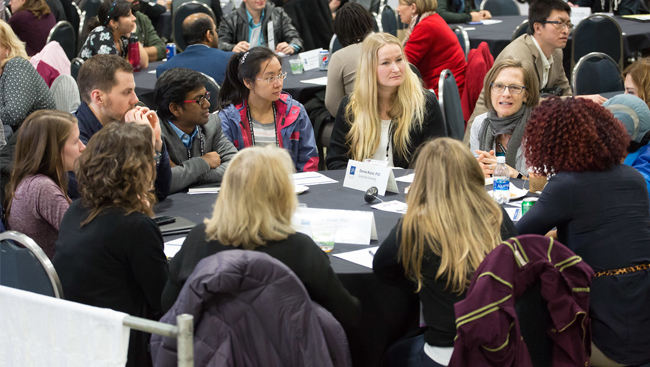According to Donna Korol, an associate professor at Syracuse University, there isn’t a standard practice for finding and securing a postdoc. But there are considerations to keep in mind to help you decide what type of postdoc is right for you and how to be a competitive candidate.
To help you navigate this process, Korol answered commonly asked questions. Click on each question to reveal her perspectives.
1. How can I find a postdoc?
There are often job postings online, such as on sites like NeuroJobs or Science. Labs that just received a big grant with postdoc slots likely will post.
A large proportion of people get postdocs through word-of-mouth and networking at events, such as SfN’s annual meeting. Students often email people ahead of time to set up informational interviews.
2. Is it acceptable to email someone you’ve never met to inquire about a position?
Emailing is appropriate and acceptable.
If someone I know reaches out and says, "My senior graduate student is finishing up and is interested in your lab," that person will float to the top of my list.
People get a lot of emails, so personalize yours. To stand out, include a short bio explaining who you are, what you've done, why you find the lab interesting, and why you’d like to work there.
3. Is it okay to do more than one postdoc?
Yes, it’s acceptable. It depends on your life situation and your career goals. You may do one postdoc and decide to do another to learn a new set of methods. In addition, you may start in industry and decide you want a more academic career, or vice versa.
I've had second postdocs join my lab. They often come with their own set of ideas, so they can contribute a lot to the PI’s research program and prepare themselves for an independent career.
Completing several postdocs may give the impression you’re not interested in running your own research program. However, some want to be senior researchers in someone else's lab so they can engage in research full-time without the administrative responsibilities that come with being a faculty member, industry executive, or other position. In this case, several postdoc experiences might provide a broad toolkit you could bring to the bench.
Regardless, fully immersing yourself in each training experience, including engaging in mentoring, grant writing, and administrative work, will always serve you well in any context.
4. How should I choose a mentor?
Choose a mentor who fits your personality, lifestyle, and career goals. If there's a mismatch, you'll be miserable. Ask your adviser and others who know you about your potential mentor’s style. Contact the prospective lab’s current postdocs and graduate students. Talk to your potential mentor to gain insight. What are their overall expectations for your position? How do they support your independence? What’s their standard publication rate for postdocs? How do they assign first authorship?
5. How important is it to publish during my postdoc? What type of publishing environment should I look for?
You want publications that have an impact in the field and set your research career in action. This can mean different things for everyone. Having impactful publications means you could have one large study where you share first authorship with three people in a high-profile outlet. Or, you could have five first author publications in specialty journals for your research area. Both are valuable and will be appealing to PIs doing different types of research.
6. I want to go into academia. Should I gain teaching and managerial experience through my postdoc, or can that come later?
I encourage postdocs to take part in all aspects of a full academic career so they can decide which area they want pursue.
If you haven't done much teaching as a graduate student, ask if there are opportunities. Think about your career intentions and try to match them as best as possible to what you’re teaching.
You can gain teaching skills more easily outside of your postdoc than you can gain research skills. I've had students who've done postdocs in research institutions and then decided later they wanted to teach. So, they taught a class at a community college to get that experience.
It’s also important to get exposure managing and mentoring undergraduate and graduate students, in addition to general lab administration, such as manuscript reviewing, writing animal or human protocols, and managing budgets.
7. If I want to go into academia, can I still do an industry postdoc?
Getting an industry postdoc doesn’t preclude your ability to have an academic career. In fact, sometimes, having that industry experience is appealing.
If you pursue an industry postdoc, make sure you’ll be able to publish your research. Otherwise, it might exclude you from some faculty searches that typically interview candidates with a solid publication record.
You could always do a second postdoc to get publications and determine which environment you prefer.
8. In my interview, do I need to have my whole specific aim for my postdoc laid out?
I would find laying out your entire aims a little unusual, and maybe a little presumptuous. Charting your postdoctoral research is typically an interactive process, even when you’re writing a postdoc grant. We want to know what kind of energy you’re going to bring, how you think, and what ideas you have to integrate your theories and methods in our lines of work.
If you have crystallized ideas for a project you’d love to pursue, instead, be prepared to say, "I’d love to continue my work. These are some experiments I've thought of, and this is how I think I could weave in my expertise to your lab." Most importantly, be excited about the new avenues of research in your postdoc lab, which will convince your prospective mentor you’re passionate about the questions and the techniques.
9. What type of research environment should I look for?
It's your time to be driven by scientific questions, so seek a lab with research aims that excite you. If you’re interested in human health, find a postdoc asking translational questions. If you’re interested in basic mechanisms, find one that works on cell and molecular biology.
However, you want to be able to set your research questions into action, so make sure the broader environment has a rich set of methods, colleagues using diverse techniques, and departments with shared instrumentation, even if your prospective lab does not.
Remember, methods come and go — and you can get method training by going to a workshop or by learning from your colleagues.
If methods training is an important goal, find out what kind of internal funding and professional development opportunities would be available.
10. What does a mentor look for in a postdoc?
Mentors look for engagement and scholarship. You should be excited and passionate about your work. They want to see what you're going to bring to the lab, how collaborative you are, and how productive you’ve been.
Be respectful of your mentors’ time. Understand the mentor has many of you, and you have only one of them. It’s helpful to set expectations. Think about being under promising and over productive. It's much better to say, “I could have that to you in a week,” but deliver it in three days, rather than to say, “I can have that to you in three days,” and then deliver it in two weeks.
11. Do I need to come to a postdoc with funding?
If a potential postdoc approaches me with their own funding, that's appealing because postdoc stipends are quite expensive. Especially if the lab doesn't have a big set of grants, bringing your own funding is a plus, but it’s definitely not a deal-breaker if you don’t.
Many postdocs get their first real funding while they're in the lab. However, making it clear you want to seek your own funding is a sign of high motivation and respect for lab resources. I recommend seeking funding through some of these resources:
12. Should I have a set plan or be open to opportunities that arise throughout my postdoc?
Having a plan is great, but keep your mind open to incidental opportunities. They may become the best things that ever happened to you.
I always encourage students to do what feels best. Gain insight into what makes you happy, what your strengths are, and what comes naturally. Think about whether you like bench work or want to manage grants or personnel. If you're not sure, try something and then decide.
Speaker
Donna Korol, PhD
Donna Korol is an associate professor at Syracuse University, where she was hired to help launch and promote the neuroscience program. She is an active member of the Aging Studies Institute at Syracuse University and the department of neuroscience and physiology at Upstate Medical University. Her research focuses on hormonal modulation of neuroplasticity across the lifespan in rodent models. Prior, Korol was a faculty member at the University of Illinois, where she also received tenure and developed many curricular and outreach programs to enhance science literacy in people of all ages, including senior citizens. She is passionate about women's health and community engagement on a local and broad scale. She obtained her PhD in neuroscience from the University of Virginia and completed a postdoc at the University of Arizona with Carol Barnes.




.png?h=1763&w=3125&la=en&hash=B2439C2768576BED6405672E5CD5CF8CB1AA375F)




